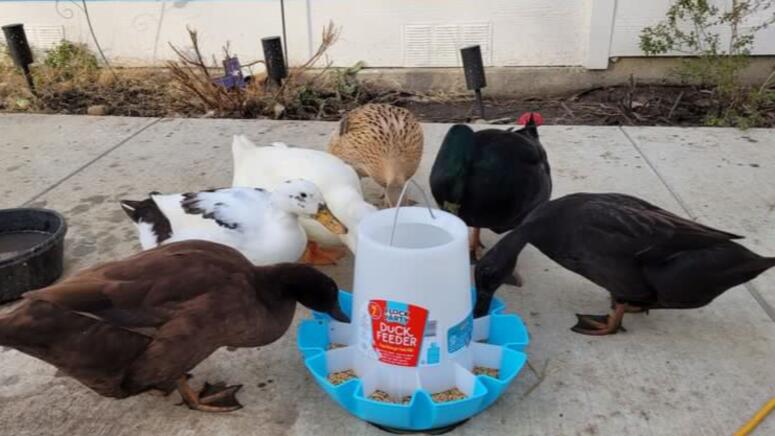
Pet Duck Frequently Asked Questions and Product Recommendations
Picture Above from Ducks of Providence Blog
Flock Party Duck Feeders & Duck Drinkers
When it comes to your “duck life” and caring for your fine feathered family, we know you appreciate quality products that streamline your pet ducks’ feeding and watering routine.
Manna Pro® created the Flock Party Duck & Goose Waterer and companion product, Flock Party Duck & Goose Feeder as easy to use solutions for your duck coop.
Read on to learn more about the products’ benefits for your ducks and you. We think you’ll concur they are must-have supplies for all types of ducks, including the popular Cayuga duck, a domesticated breed known for its black feathers glazed with a beetle green iridescent sheen.
If you’re thinking about adding ducks to your farm family, we’ve also included answers to commonly asked questions about raising and feeding ducks and resources to help you get started with your very own backyard flock party.
| Duck Drinker | Duck Feeder |
| Holds 5 qts of water | Holds 7 lbs of feed |
| Designed for duck bills | Designed for flat bills for ducks and geese |
| Heavy duty and durable | Feed 5-15 birds at once |
| BPA-free plastic | BPA-free plastic |
| Easy-to-see water level | Easy-to-see feed level |
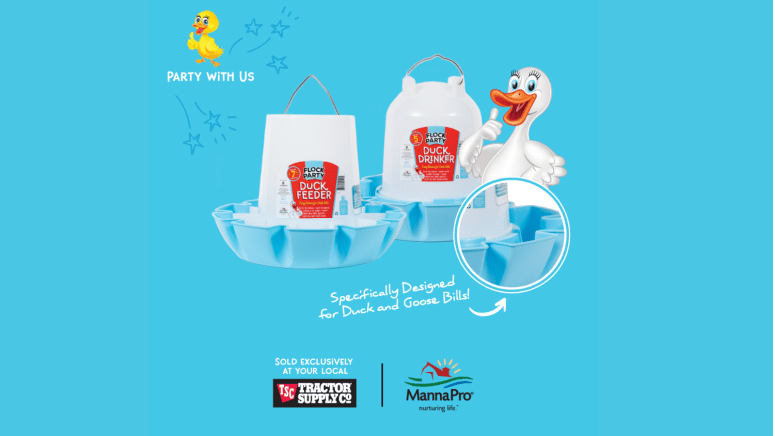
Are Ducks Good Pets?
“If you are looking for backyard entertainment, then ducks are your best bet. They are hilarious, active, curious creatures who also lay delicious eggs.”
~ Lisa Steele, fifth-generation chicken keeper, and well-known founder of Fresh Eggs Daily Blog
Ducks can absolutely make great pets if you’re ready and willing to provide the daily care they need to maintain their happiness, health, and well-being. These backyard comedians will pay you back in spades on the daily with their amusing antics and delectable fresh eggs.
Keep in mind, with proper care, ducks can live up to 10-15 years and can earn their keep as they lay eggs more regularly than chickens. Additionally, they “manufacture” loads of droppings you can compost as a fabulous garden fertilizer. They can also be your best backyard bug buster as the birds eat heaps of annoying insects and are significantly less destructive to your landscaping and yard than chickens.
On the flip side, ducks require more daily care than chickens. For example, ducks need ample fresh water. Since ducks will constantly poo in their water it will need frequent cleaning and/or replacing.
Another consideration is ducks can be quite noisy and vocal which can irritate neighbors that are not duck enthusiasts.
Pet ducks, because most don’t fly, are prone to wildlife predators. Duck pens will need covers to defend against winged threats like hawks. When ducks are outside free roaming, they’ll need to be watched and protected from non-duck friendly domestic dogs, wild coyotes, and other four footed foes.
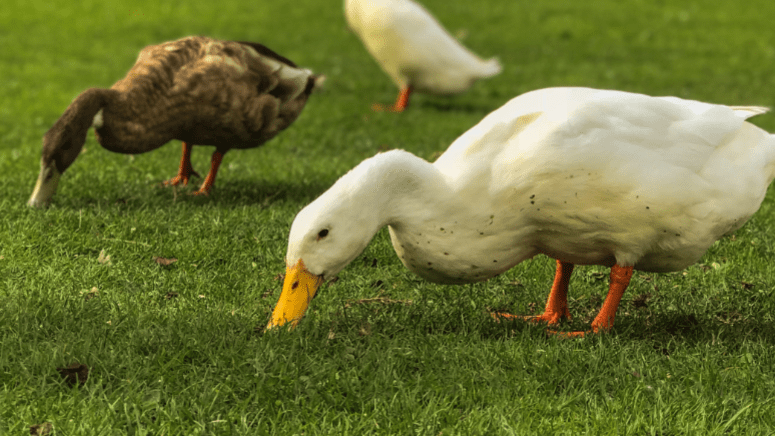
Benefits of Eating Duck Eggs
Did you know that different types of eggs have different health benefits? The benefits of eating duck eggs are plentiful.
For example, did you know that duck eggs have a higher fat content of omega-3 fatty acids than chicken eggs? Additionally, duck eggs are larger, offering a larger yolk and more protein. Duck eggs taste rich and delicious.
Read on for our recommendations on how to optimize egg production in your ducks through a balanced diet.
What do ducks eat?
Ducks are omnivores and in nature eat a variety of plants, seeds, grains, fruits, vegetables, small mollusks and fish, and insects.
If you’re raising ducks in your backyard, in addition to natural food choices, there are many varieties of commercially available duck feed and treats formulated for specific life stages - newborn ducks, adolescent ducks, adults, and egg producing ducks. As ducks mature and grow their nutrition needs change. It’s critical to their optimal health and development to feed ducks based on their life stage.
What can you feed ducks?
You can feed ducks food of both plant and animal origin. Just like pet cats and dogs, pet ducks have specific dietary needs during their various life stages from birth to adulthood.
Ducks can eat a wide variety of natural food sources - insects, seeds, fruit, plants, vegetables, small mollusks, small fish, and grains. There’s also a wide array of commercially available duck feed that’s nutritionally optimized for all duck life stages.
Scroll down to the “Best things to feed ducks” section for detailed information on ducks’ dietary requirements and feed choices.
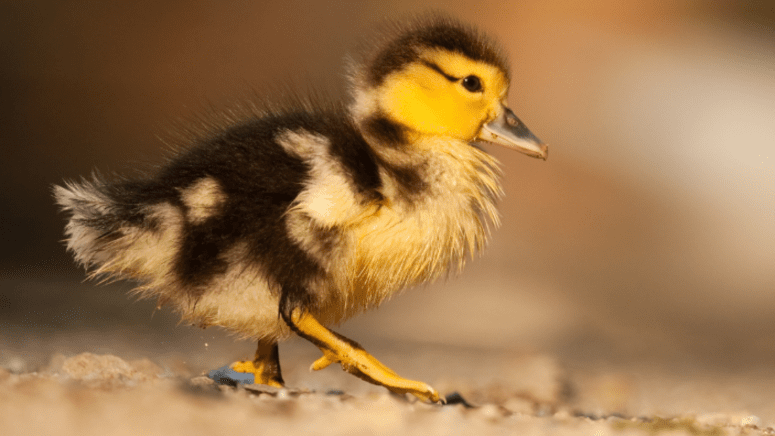
What can you feed baby ducks?
Because baby ducks, known as ducklings, grow rapidly especially from birth to two to three weeks of age, it’s important to start them on a duck starter feed formulated for optimal nutrition that supports their growth. Baby duck feed typically contains 18 to 20% protein and a specific vitamin and nutrient mix.
Niacin, also known as B3, is an essential vitamin required for the proper growth and development of ducklings. Ducks require more dietary niacin than chickens. A duck diet that lacks adequate niacin can result in deformities and leg problems. You’ll want to ensure your duck feed contains adequate niacin.
After the duckling’s first two weeks, you’ll want to gradually switch from the duckling feed to a grower/starter feed containing protein around 15%. It is important to decrease the protein levels as feed containing too much protein can cause health challenges like “angel wing”. The condition happens when the abnormal growth causes the wing tip to rotate away from the body, hence the “angel wing.”
Typically, feed for young ducks is in a crumble form as it’s easier for them to eat as pelleted feed is frequently too large for younger birds.
Best thing to feed ducks?
The best thing to feed ducks depends on their life-stage as their diet needs change. Domestic ducks do well on pelleted feed and can also be fed certain snacks.
Baby duck nutrition
For example, newborn ducklings will eat a specially formulated feed and transition to a grower/starter feed within a few weeks. Proper protein levels are critical for growing ducks as excess protein can wreak havoc with their development resulting in abnormal conditions like angel wing.
Adolescent duck nutrition
A duck, at nine weeks of age, reaches 70 to 90% of its full growth. It’s recommended to maintain the grower/starter feed diet of around 15% protein until adulthood which occurs between 18 and 20 weeks.
If you need show-quality feed for show ducks, there are starter/grower feed options for showbirds and gamebirds available.
Adult duck nutrition
An adult duck’s diet will depend on if they are laying eggs or non-laying.
Egg-laying ducks require a feed containing extra calcium and 16 to 17% protein that’s specifically formulated for layers.
There are also duck feed options formulated with pro-biotics that can optimize your layers’ digestion and gut health.
Male ducks, known as drakes, and ducks not used for laying eggs need a diet that contains between 12 to 14% protein. Their feed doesn’t need supplemental calcium as the excess calcium can result in kidney stones.
Oyster shell is often supplemented to egg-laying ducks’ diets to provide additional calcium needed to make strong-shelled eggs. When the oyster shell is fed singly from duck feed, ducks will naturally consume the needed amount.
Adult ducks used for egg production require more calcium and protein than non-egg producing ducks. Calcium deficiency in an egg laying duck’s diet can cause eggshells that are pitted and thin, unlike the usual thicker shell of duck eggs.
Duck Grit
Additionally, ducks need dietary “grit”, a combination of sand and stone that assists in grinding and digesting feed. Free-range flocks intake natural grit when eating insects and greens. In contrast, pen kept ducks will need grit added to their feed around one time per week.
Duck Scratch
Commercially available chicken scratch and organic scratch, made of wholesome nutritious grain mixes that can also be fed to ducks, are also great options. Seeds and nuts can be fed individually though it’s critical to make sure the sizes are small enough so as not to cause choking.
Duck Treats
When selecting duck snacks or treats, be sure to pick …that close to their natural diet - plants, seeds, grains, insects, and small mollusks.
Greens and vegetables that are good duck treats include but are not limited to peas, corn, cucumber, squash, carrots, ripe tomatoes, pumpkin, grass, weeds, lettuce (except iceberg), and kale.
Ducks also love earthworms and mealworms which are simple to raise or can be purchased in fishing and pet stores. Manna Pro offers Superworm™ Swarm, a convenient ready-to-feed duck treat of delectable flock favorite insects that you can buy online or in stores near you. Other nutritious protein sources include meat and chopped or small fish.
Fruit is also a favorite duck treat. Apple slices, melon, berries, peaches, and plums are all great choices. Be sure to remove any fruit pits or seeds before feeding.
- Veggies for Ducks: green peas, lettuce (no iceberg), carrots, squash, tomato, cucumber, kale, pumpkin, corn
- Fruits for Ducks: pears, strawberries, blueberries, bananas, plums, apples, blackberries, peaches, watermelon
- Protein for Ducks: seeds, insects, small mollusks
Manna Pro Duck Discs and Flock Party Quack Snacks are new-to-market nutritious duck treats packed with protein and essential trace minerals and are also great for enrichment. Place the floating disc treats in your ducks’ pool, and enjoy watching their antics as they swim, dive, and munch on their new favorite snack. Quack Snacks can be fed on the ground.
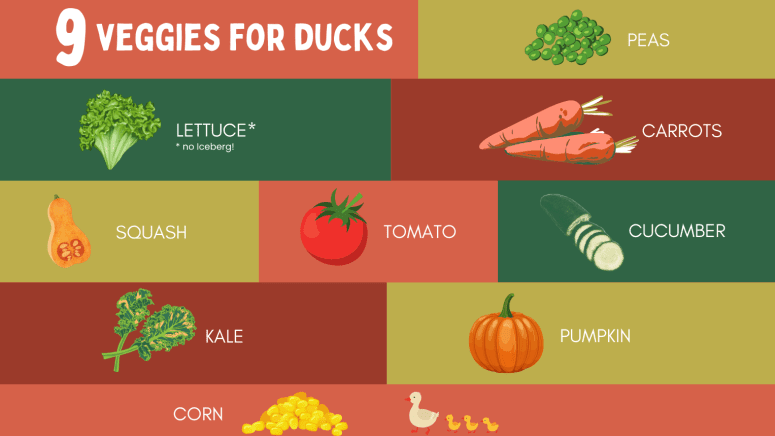
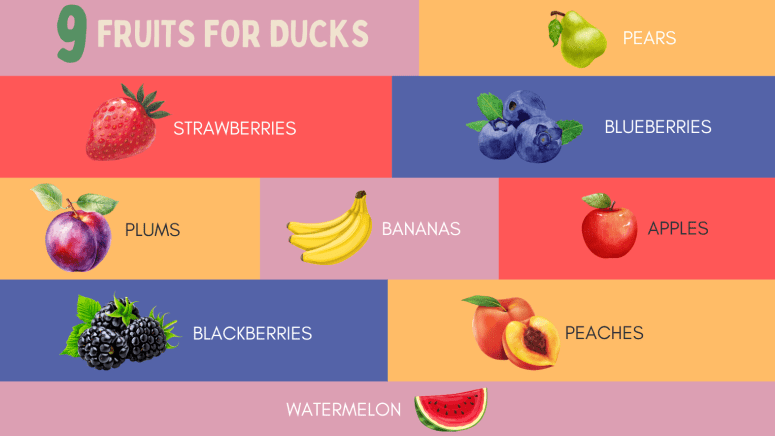
Can ducks eat chicken feed?
Feeding ducks chicken feed is not recommended because ducks have different nutritional needs than chickens. Ducks and chickens have different dietary needs similar to the way dogs and cats require different diets for optimal nutrition.
What supplies do I need for pet ducks?
You’ll need a variety of supplies for your ducks’ coop, yard, and nutritional needs.
Below is a list of duck supplies, including duck coop supplies, that will support keeping all types of ducks safe, happy, healthy, well fed, and providing you comic relief for many years to come!
Supply list for ducks
Here’s a list of supplies, including duck coop supplies, that will support keeping all types of backyard ducks safe, happy, healthy, and well fed:
- Incubator, if raising ducks from eggs
- Duck feeder
- Duck waterer
- Duck house, or coop and enclosed yard that’s predator proof
- Niacin supplement
- Duck treats
- Chicken scratch that’s also nutritionally formulated for ducks
- Duck feed for each life stage: ducklings, young ducks, adult ducks, egg layers, etc.
- Clean bedding
- Chicken Coop Deodorizer
- Swimming pool
- Clean water
- Grit
- Protection from weather
- Safe heat source such as a heat lamp
- Thermometer to monitor heat source temperature
- Non-toxic natural cleaning products for duck coop, feeder, and waterer
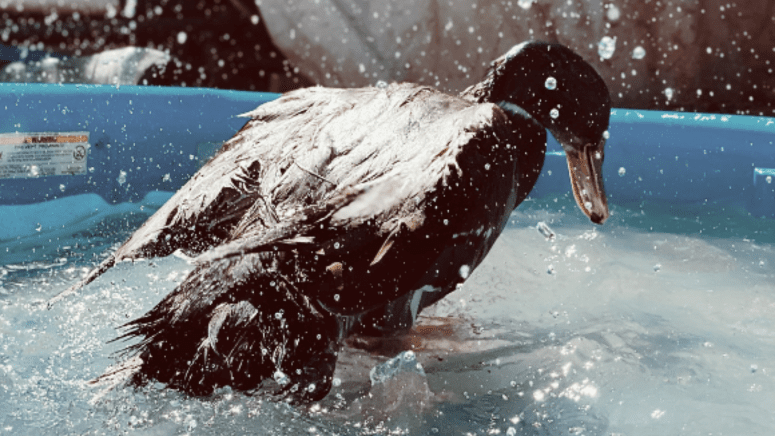
Resources for Raising Ducks
Blog: Get Started with Backyard Poultry by Lisa Steele
Book: "Duck Eggs Daily: Raising Happy, Healthy Ducks... Naturally" by Lisa Steele
Book: "The Ultimate Pet Duck Guidebook: All the things you need to know before bringing home your feathered friend" by Kimberly Link
Join Us on Social Media!
We’d love to hear from you on social media! Use the hashtag #CityYolks to be featured on @cityyolks and/or tag us on our Instagram and Facebook accounts.
Follow Manna Pro: @YolkTubeByCityYolks, @mannaprohomestead, @mannaprohorse, @MannaProHomestead, and @MannaProHorse.

